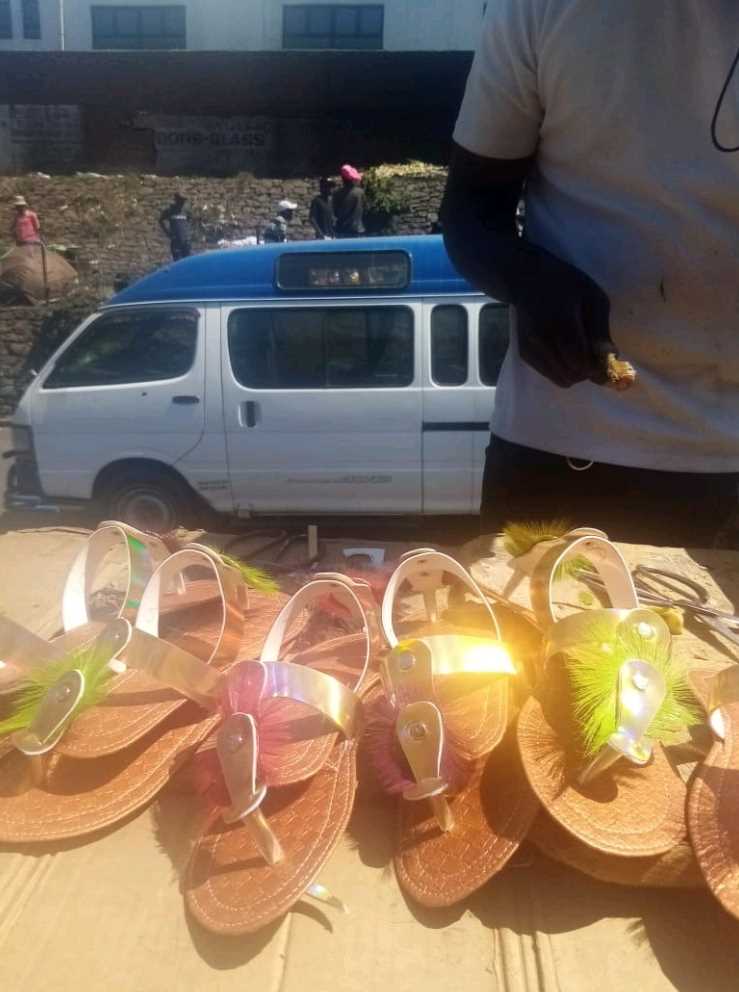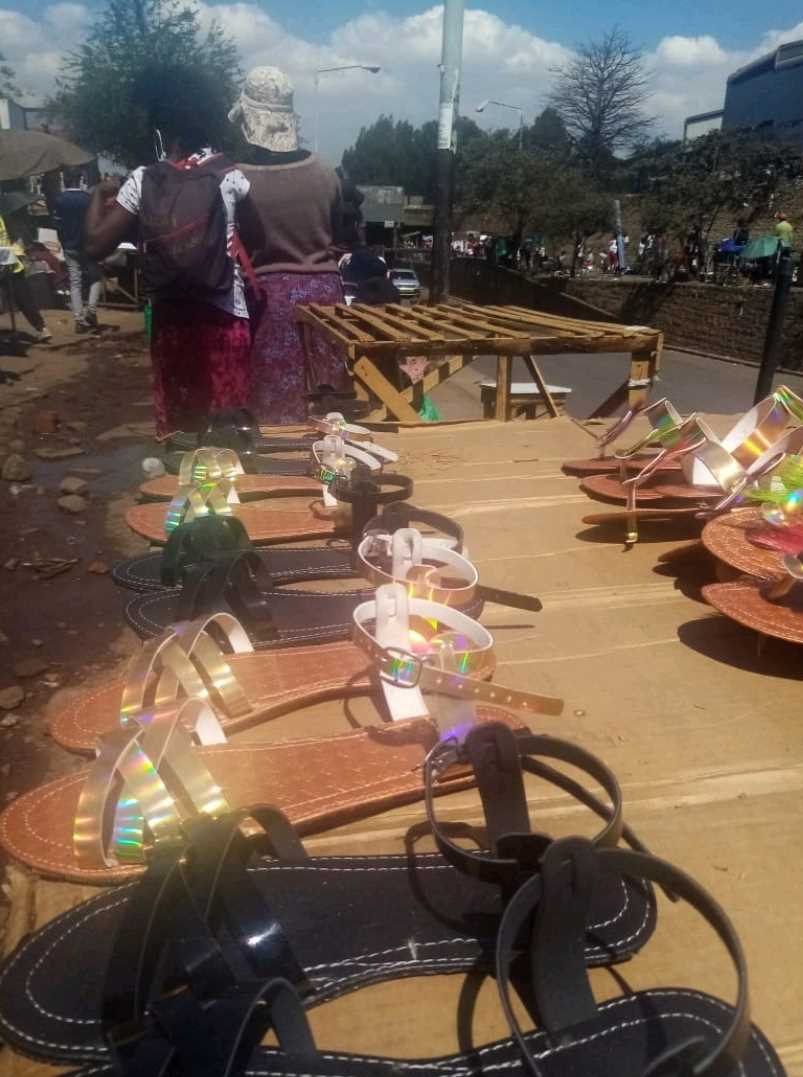
Trish Muungani strolls down the streets of Harare feeling trendy in her glittery gold sandals.
“They are fashionable and comfortable. What more can a girl ask for?” she says.
She and the thousands of women in Harare and other places in Zimbabwe have no idea that their golden fashion sandals are handmade in the open by a small group of shoemakers in downtown Harare.
Armed with little beyond talent, motivation and innovation, a number of small-scale enterprise shoemakers are helping many make a fashion statement.
A recent visit by Zimbabwe Now to Mbare established the shoemakers get their leather in the form of off-cuts from companies in the nearby Southerton industrial area who would have imported it from outside the country.
Other materials such as pins and glue are procured from nearby shops.
From functionality to fashion

The shoemakers are based near the traffic bypass which bridges downtown CBD and the small scale industries of Magaba in Mbare, popularly known as PaFlyover.
They say that they are managing to survive comfortably after diversifying to fashion lines in order to attract a new market.
“In the past we only made “manyatera” (tire sandals) to service mostly rural based male customers. These are very durable and a customer could spend a couple of years or even more before coming back for another pair.
“Then we realized that women’s shoes move fast because every lady wants to be fashionable. And that we had the capacity to make trendy shoes that move with the times,” said one of the shoemakers who did not want to be identified.
The shoemakers say that volumes have gone up since they ventured into ladies’ ranges but the original line of strong men’s sandals made from leather with tire soles still remains a viable one.
“We have also gone into fashionable lines for the men. Our clients are no longer rural farmers only. Even urban males want strong and comfortable sandals. So for those ones we play around with fashion trends,” said the shoemaker.
None of the shoemakers was comfortable discussing what they make but they all confirmed that business is viable.
Women staking their claim
Women are not just end consumers of the products. Mai Yu, a female shoemaker who preferred her face to be obscured says that she is willing to take on female apprentices so that more women can come into the trade.
“Women ought to be self-sufficient and not wait for spoon-feeding from their husbands. I’m willing to impart my skills to people of the same gender as me who are keen to become entrepreneurs.
“I can do this at a very low cost, making sure I teach them all the designs and pattens of sandals within a period of just a week,” said Mai Yu.
Another female shoemaker said she acquired the skill from friends in the street, and now had the capacity to make an average of 20 pairs per day and can do more with better equipment.
An important economic pillar
Manufacturing Small to Medium Enterprises play a leading role in the growth of the economy in Zimbabwe, but it has been noted they require technical, financial and marketing support if they are to thrive more. In the absence of these key needs, a number have, over the years, been compelled to close shop.
Statistics from a Confederation of Zimbabwe Industries (CZI) survey, show that more than 400 registered enterprises shut down in 2000 alone owing to a plethora of challenges.
“The performance of manufacturing SMEs, like all other sectors, fundamentally depends on the macro-economic environment.
“Overall, high levels of inflation and interest rates, high budget deficits and debt burden, declining savings and investment, a weakening Zimbabwe dollar and foreign exchange shortages characterize the Zimbabwean economy,” the report noted.
While SMEs are spread across many sectors, they are mostly concentrated in the manufacturing sector.
According to the 1991 GEMINI study, close to72% of all micro small and medium enterprises were engaged in manufacturing compared to 21.7% in trade, 4.3% in construction and 3% in services (McPherson, 1991 in UNDP, 2001).
Food processing, light engineering and metalworking also constitute a significant part of Zimbabwe’s manufacturing base.
Hon. Dr Sithembiso Nyoni, the Minister of Women affairs, Community, Small and Medium Enterprises Development, says SMEs are a deliberate initiative by Government to support the economy by empowering persons who have opted to engage in the informal sector.
“Through the years, the SME and Cooperatives sector have gone on to occupy a prime position in business. The SME sector now employs over 60% of Zimbabwe’s productive workforce, contributes to over 50% of GDP, and constitutes 70% of business in Zimbabwe.
“These statistics are a testament to the fact that our entrepreneurs, working through the SMEs, are major contributors to employment creation, poverty alleviation and the socio-economic transformation that we so desire as a nation.
“It is important to note, however, that the emergence of this sector did not happen by accident, but was
through the deliberate and carefully orchestrated efforts of my Ministry and Government support to empower and enable this sector to lead in transforming the economic fortunes of Zimbabwean grassroots,” she says.
The glitter could be brighter
An entrepreneur at the site, Edwin Karumazondo, said he hoped the new government policies will improve and favor them by, for instance, allocating a legal site that would make it easy for customers to locate them as is the situation with the Glenview 8 SMEs area.
Their major market is from of walk-through clients whereby they sell to pedestrians crossing between town and Mbare. There are also some traders who come to buy in bulk and resell at flea markets and on the streets in different parts of the city and other areas of the country.
Some shoemakers supply their products to shops within the central business district, while others even export to countries such as Tanzania.
Access to finance is a challenge that the shoemakers are facing and this hinders their capacity.
“We also don’t have enough capital to buy sufficient leather so we end up producing sandals in smaller quantities than we would wish for,” said Mai Yu.
Leave Comments